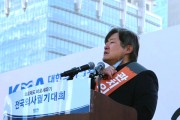From Ilbe:
I will explain why doctors are going nuts
As you may know, it is possible that doctors will go on strike. Most TV programs where non-medical experts discuss the issue don’t seem to address the real problems. I know very well that people tend to harshly bash high-income professionals when they go on strike. I’m not writing this to ask you to support the doctors’ strike if they decide to go for it. I’m writing this just to help you understand why these doctors are going nuts because I feel it hasn’t been properly explained to the public.
TL;DR: Health Insurance Review & Assessment Service (HIRAS) and National Health Insurance Service (NHIS) should stop their excessive bureaucracy. Stop with “medical fascism”.
Hello, Ilbe bugs. I have a lot to say but I don’t know where to begin. It seems many other doctors have made comments here but they were often asked to shut up and prove that they are real doctors first. So here you go.
Let me get a few things straight before we begin.
1. Doctors are opposing telehealth and the establishment of subsidiary companies. But in fact, the main sources of all problems are the low medical fees and tyranny that the HIRAS created during the Dog Dae-jung administration.
2. Doctors are a group that has a lot more rightists than usual. Just because we oppose the government policies, don’t blindly lump us with those bastards from the Korean Confederation of Trade Unions who want to overthrow the government.
3. Doctors are worried about “commercialization” of health care. However, leftist bastards, including the Democratic Party, are distorting it into health care “privatization” which they have chosen as a theme for their anti-government campaign. Doctors who are mostly right-leaning consider it to be unpleasant.
4. Lefty Daum or Naver fellows are blindly supporting doctors just because we are opposing the government policies.
5. After the presidential election, there has been an influx of many newbies who have changed the nature of this forum. There are more users who blindly bash us just because we are opposing the government policies as high-income professionals than there are users who consider the matter seriously.
First of all, let me talk about the health care privatization issue. In Korea, every medical institution is supposed to take care of national health insurance plan subscribers. 94% of medical institutions are privately-owned and 6% of them are owned by the central or local governments. Just in terms of ownership, health care has already been privatized in Korea.
However, since every medical institution must take care of national health insurance subscribers, the service is for the public interest. This is what governor Hong Jun-pyo repeatedly talked about when the Jinju Medical Center was closed. Therefore, as long as this “national health insurance designation system” is not abolished, they say there will be no privatization of health care. Technically, it is proper to call the real issue privatization of health “insurance”.
The government takes money from citizens and when they get treated as patients, they pay a bit to the doctors and later pay the remaining fixed medical fees for the corresponding treatment to the doctors or medical institutions. The dark history of medical insurance is too long and complex. I can’t explain it all here. Refer to the following blog.
http://blog.naver.com/ipudo/120205203932
Besides what’s mentioned in the blog, the chronic complaints that doctors have are as follows:
1. The low medical fee that is kept below inflation: According to the report entitled “Revision research report for relative value points” from the HIRAS in 2006, the medical fee charged was only 74% of the real costs while the prescription filling fee for pharmacists was 126% of the real cost. Because the medical fees for intensive care units, ER and pediatrics were even lower than that, they ended up losing more per patient. After Dae-jung implemented a policy that separated medicine dispensation from medical practices, various fees for pharmacists were created. Since 2000, this has been pointed out as a main cause for undermining the finances of the national health insurance fund. On the other hand, the government has acknowledged that the medical fee is too low. Before the separation of prescribing and dispensing drugs, the fee to fill a prescription was only 100~500 won. But after the separation, the fee went up to 5,468 won in 2007, 5,594 won in 2008, 5,676 won in 2009 and 5,858 won in the first half of 2010. The filling fee has increased by ten-fold. In 2009, 2,600 billion won was spent for the filling fees, which accounted for 6.6% of the total medical care expenses. In many other countries, there is no filling fee and if even there is, it doesn’t make up much in the total medical care expenses. In Italy and the U.S., it is 4.9% and about 2.9%, respectively. It is very high in Korea. If some pharmacist Il-gays read this, I hope you don’t find it unpleasant. I’m just stating the facts.
2. The unfavorable makeup of the committee which sets the medical fees: Every year, National Health Insurance Policy Committee determines medical fees. The committee consists of eight service providers (Medical Association, Dental Association, Pharmaceutical Association, etc.), eight subscribers (civic groups that you Il-gays hate) and eight public interest representatives (Ministry of Health & Welfare, Ministry of Strategy & Finance, HIRAS, NHIS, etc.) Some people ask us what we’ve been doing up until now. As you see, eight medical service providers are bound to be “democratized” by the other sixteen members in the committee. It’s practically impossible to oppose suggestions from the government or voice our opinions loudly.
3. Bureaucratic medical care due to excessive control by the HIRAS: Future Korea editor Han Jeong-seok often uses the term “medical fascism”. This is the fundamental reason why doctors are mad. When we first begin working at a hospital after graduation, we normally try to follow the textbook or up-to-date international standards for treatment. However, the HIRAS doesn’t listen to doctors and sets their own medical standards to manage their finances. If we don’t follow their standards, we don’t get paid enough for our treatment. Let me give you some examples.
There is a disease called Thrombotic Thrombocytopenic Purpura (TTP). Blood shouldn’t coagulate in normal blood vessels. If you get this disease, little chunks of coagulated blood move around in your body and damage your organs such as the heart, kidneys and brains. The mortality exceeded 90% in the past but these days, it is well treated with the plasma exchange therapy. However, the tools used in the therapy, the required huge amount of FFP or albumin solutions are not cheap. According to the international academic committee, plasma exchange therapy is recommended as the primary method of treatment but the period of treatment is up to each doctor’s discretion. If it goes well, two or three courses of treatment should be enough but if unlucky, it will take longer than a week. It is only natural that doctors will try to treat their patients until they are completely stable. But if you treat someone for longer than usual, the HIRAS bastards will come in and interrogate you as to why the treatment was prolonged. Then they decide not to pay for a large portion of treatment costs depending on their whims.
For another example, let me talk about cancer patients. We say a patient is completely cured if their cancer doesn’t come back within five years of completing treatment. This is the happy scenario but in many cases, cancer comes back. When that happens (as you guys always see on TV dramas), it could be something nasty because it spread through the entire body. The doctor and everyone involved gets very worried. Let’s say we surgically removed the cancer again. Then chemotherapy should follow. The standard anticancer medicine doesn’t work very well in that case. There are better new medicines from foreign countries we can use but the HIRAS bastards are behind the times and do not acknowledge this. If we try to use the new medicines, the HIRAS steps in. Let’s say we decide to treat the patient with new medicines on our own to save them under their agreement. But if the patient or their family reports it to the HIRAS later, we doctors have to pay for all the costs. Even if there is a possibility of patient longevity, we don’t have much choice in medicines because of the HIRAS sons of bitches in many cases.
Let’s see what’s happening to orthopedic clinics. This is a comment written by an Il-gay named ‘Hamdaedo’ on http://www.ilbe.com/2722155597
In the case of our orthopedic clinic, most patients come for physiotherapy and most of them are seniors. We removed the ward because it never generated any profits.
1. A patient is allowed to get a maximum of ten sessions of physiotherapy per month, although no medical textbook says it should be limited to ten sessions. Degenerative arthritis or slipped discs have no permanent cure. In serious cases, surgical treatment is required but for other cases, preservative physiotherapy is performed to relieve the symptoms. You can’t really tell them to come for physiotherapy only ten times per month. They come to us because they feel pain. However, if we perform physiotherapy more than ten times per month, we lose money. In other words, the NHIS won’t pay us for the extra costs.
2. Spinal cord retraction treatment is limited to once per week. For spinal canal stenosis or intervertebral disc, retraction treatment can relieve the symptoms a lot. However, if we do it more than once, we lose money.
3. Joint exercise therapy is limited to once per week. If you have dyskinesia due to joint problems such as frozen shoulders, you need to do exercises for the joint and improve its movable range. However, this therapy is also limited to once a week. How useful can it be with only one session per week?
4. If a patient who gets treated for chronic arthritis is also prescribed the drugs for a cold on the same day, we lose money. We have to pay for their medicine. Old people in the countryside usually want to get everything done when they visit a clinic. But if they get more than six different types of drugs, we have to pay for them. Even if the drugs are for two different diseases, the committee doesn’t care. If the number exceeds a fixed value, we have to pay for it. So we have to send them to another clinic or ask them to come back tomorrow. What kind of nonsense is this?
I’m still at work so I can’t write long. The nonsense doesn’t just end here. I don’t know whether the current medical fee is high or low. Most doctors just wanna get paid as much as they treat their patients. Is this wrong? However, most doctors end up paying for the patients for effective treatment. To make up for the loss, doctors tend to recommend nutritional supplements and care about discretionary grants. They don’t even need to increase the medical fee much. Just apply at least half of the inflation and let us get paid just as much as our services.
What was the point of studying hard when we were students or residents? When we finally start working, we just end up having to follow HIRAS’ standards. This is why we sarcastically say we should just study with the HIRAS manuals rather than textbooks. Do you think this is really okay?
The government control doesn’t just end there. Have you heard about the Diagnosis-Related Group (DRG) system? Last summer, doctors considered going on strike because of that but gave up. In the conventional Fee-For-Service (FFS) system, each treatment is paid for separately. But in the DRG system, multiple types of treatment are grouped under the same category and fee. It’s like the government forces you to charge 3,000 won for all jajang dishes such as regular jajang, Gan-jajang, Double-jajang, Seafood-jajang, Jaengban-jajang and Sichuan-jajang even though they require different ingredients.
Take an example from eye clinics. You may think of LASIK or LASEK first but they also do a lot of cataract surgeries. LASIK or LASEK is not covered by insurance and the demand for these surgeries is high. That’s why ophthalmology is popular among medical students. For cataract surgeries, artificial eye lenses are used. American products are expensive but good while domestic ones are cheaper but crappy. In the old FFS system, we could choose any lens we wanted and claim payment accordingly. However, in the DRG system, it is hard to use American products because the price limit is imposed. The Korean Ophthalmologists Association conducted a survey on patients to see which way they prefer. Of course, more people opposed the DRG. However, the government pushed ahead with their plan over a year ago. As expected, doctors feel guilty using cheap products but using American products doesn’t let them make money. Eye doctors are increasingly leaving the field of cataract surgeries.
It’s even worse with obstetricians. You may all know about cesarean operations. During this operation, sometimes you can detect appendictis, uterine myoma or ovarian cysts. In the past, doctors could deal with them all in one operation. However, in the DRG system, they can’t claim costs for additional surgeries. For the sake of patients, it is necessary to do combined surgeries but you don’t get paid a penny for that. Do you think it is okay to put doctors in a position where they have to morally suffer from deciding between the best treatment method and costs? This is not the only problem. After the cesarean operation, they use an anti-conglutination agent so that the uterus doesn’t get conglutinated with nearby organs. This agent’s use is also bound by the price scheme defined by the DRG system but the price limit is set even lower than the real cost. The Ministry of Welfare & Health said the medical fee includes the cost for the agent but they didn’t tell you it was set at such a low level. Most patients prefer to use the agent so doctors requested changes in the price limit but the reply was only something to effect of “Limit its use on your own.” What’s more shitty is that you can’t claim extra costs for pain-killing shots. Also, sometimes the mothers classified as highly risky have to be sent to a bigger hospital because excessive bleeding requires blood transfusion that increases costs. Celioscope surgery is currently widely used because the patient’s recovery is fast and the scar is minimal. But since it uses a lot of consumables, some surgeons are reverting to the old cheaper method that opens the abdomen.
Let’s get back to the topic of a strike. Let me talk about telehealth a bit. A pediatric doctor wrote this. It was written well.
https://www.facebook.com/permalink.php?story_fbid=431608676961609&id=100003374407870
And before someone bullshits that he sounds like a lefty commie and what not, the doctor is a conservative from the conservative mecca of Daegu as you can see from his Facebook.
Telehealth: The government says they are implementing this for the convenience of patients in remote areas. But in fact, the government promoted it as part of the creativity-driven economic plan until the Korean Medical Association opposed it. Samsung is lobbying the hardest for this. Samsung Medicine is already ambitiously preparing for it. If it is implemented, there will be cooperation between Samsung, telecommunications companies and large hospitals. Patients already flock to tier 3 hospitals [large, multi-department hospitals] and there is a concern that this will get worse with telehealth. The government says they won’t let large hospitals offer telehealth in order to help tier 1 clinics, but most people know that large hospitals are preparing for telehealth. The people who write editorials in favor of telehealth are mostly professors at large hospitals. Seoul National University Bundang Hospital has signed an MOU with Gartner Korea. You know what’s going on. Of course, I’m not denying the positive aspect that this can provide an opportunity for a new industry to grow.
There are different reasons for opposing telehealth. In our country, you can find doctors at public health centers even in many small islands or remote places, (Some people say there will be lack of public doctors due to medical schools but starting in 2015, those schools will be reduced or closed). You know what my biggest concern is these days when I try to do medical volunteering? There are so few towns that don’t have a doctor so it’s hard to find a place where medical volunteering is actually needed. Still, there must be some people who live in really remote places. Even if they get examined by telehealth, however, they still have to go to a pharmacy to get drugs due to delivery problems. Isn’t that a bit funny?
Let me talk about fundamental reasons for why most doctors would consider teleheath to be a really stupid idea. These are basic elements required for examining patients.
1. Asking questions: No problem with telehealth.
2. Physical check-up: Ocular inspection, auditognosis, plexor test and palpation. These four are the basics. I don’t know how sharp the telehealth device’s image can be but it won’t be 100% same as seeing it in person. For other inspections, what can I do when the patient isn’t next to me?
3. Various tests using devices: After completing the above 1 and 2, additional tests such as blood test and imaging should be done to confirm suspicious diseases. The patient has to come to the hospital, of course.
This is the standard procedure to diagnose diseases and determine treatment methods. However, you can’t do anything other than asking questions and doing an ocular inspection with telehealth. Doctors are not psychics. How can we make a good judgement through telehealth? Of course, we will be worried about misdiagnosis.
Take an example of a stomachache, which is one of the most common symptoms. There are various causes for it and what we first need to figure out is whether we need to do a surgery urgently or not. Look at the commonly known issue of appendicitis. When it is suspected, we basically press the lower right abdomen and see if the patient feels pain. But this is not as easy as it sounds. Each doctor needs some know-how for interpreting the patient’s reaction. We can’t just ask the patient to press their own abdomen to judge for themselves. Let’s say I couldn’t get enough information through telehealth so I told the patient to contact me later or come to the hospital when the pain gets worse. If the appendicitis got worse and even caused peritonitis in the meantime, I have to take responsibility for it and the patient has already been injured.
The Ministry of Welfare & Health says telehealth will be mainly done for checking chronic diseases such as high blood pressure or diabetes. However, on KBS Late Night Debate, they said telehealth will be allowed to examine a new patient, too. What was really absurd in the Ministry employee’s claim is that the first medical exams will be done only for minor diseases. But how can we be sure whether the disease is minor or not in the first place? This doesn’t make sense. Also, even for a chronic disease, we have to monitor whether it gets worse and causes complications. This is also hard to determine with telehealth. For example, if a patient’s legs get swollen, we have to touch them to see what is really the matter.
Since there are potential problems like these, the Korea Medical Association claims that a demo project should be done first to see its effectiveness and fix its problems. But the government wants to create a new law first and amend it later. How can we remain silent? It’s all good that they are going for it because it looks like a good business project for the creativity-driven economic plan. However, they shouldn’t put patients in a potentially dangerous situation.
Establishment of subsidiary companies: So far, we have made up for deficits from treating insured patients through luxury ward fees, special treatment fees, and operating parking lots, funeral homes and cafeterias. With the new plan, we can create subsidiary companies to run hotels, fitness clubs, bathhouses or develop and sell medical devices or nutritional supplements. This is only applicable for large or mid-sized hospitals with capital. You may think there is nothing wrong with this as consumers, but from a doctor’s perspective, it is undesirable that doctors will feel some inner conflicts when they try to lead their patients to consume more like a salesperson instead of focusing only on effective treatment. Also, if a subsidiary company makes medical devices, you can imagine the hospital management will pressure their doctors to produce more positive results with those devices. Large hospitals already pressure doctors for better treatment results.
Let me also talk about some income issues. It’s true that doctors make good money. Those doctors who are over 70 now used to make an enormous amount of money. Compared to then, it is much less now. There are considerable differences in income depending on the discipline, hospital, university and region. Roughly, interns and residents make 2 million won and 2-2.5 million won. Clinical instructors make 3-3.5 million won. Guys are usually 35-40 years old around then. Professors make 5-8 million and if you become a salaried doctor at a private clinic, you get 5-15 million won. Most doctors eventually open their own clinic because it’s hard to be a salaried doctor once you are in your fifties. The hospitals can run even though the medical fees are only 75% of the prime costs, because of those aforementioned additional businesses. The government is aware of how this works. The most profitable clinics in tier 1 are eye clinics, plastic surgery clinics and dermatologists, where Kimchi bitches are the main non-insured customers. These days, psychiatry, rehabilitative treatment and medical imaging are also popular fields as they get paid well while the work is not too hard.
The disciplines going under due to the low medical fees are ob/gyn, cardiothoracic surgery and urology. The job is tough and even if you become a specialist, it’s hard to work only in that field. It’s a vicious circle as the number of applicants decreases due to low popularity. Take an example of ob/gyn. Obstetric clinics with delivery rooms are especially in a bad situation. Pregnancy can induce suddenly dangerous situations. In the past, there were many cases where either a mother or her baby or both died during delivery. The maternal mortality rate has been increasing in recent years. It is because obstetricians quit running delivery rooms and there are less new applicants in the department.
Why would it be shitty to run a delivery room? As I said, during delivery, there is a high chance that an emergency situation will occur and even if there is no fault from the doctor, the mother or her baby can be damaged. If either of them dies or the baby gets cerebral palsy, the doctor has to pay 30% of a maximum 30 million won of compensation even if the doctor didn’t make any mistake. This is not even a communist country. I don’t understand the reasoning. After delivery, the doctor can get nit-picked and sued for various reasons. Because it’s tough like that, those doctors give up their own specialization and open beauty clinics to serve Kimchi bitches.
If doctors in small towns keep closing delivery rooms, mothers will have to travel to cities for delivery but if they are unlucky, something bad can happen. Have you heard about the pregnant lieutenant who was stationed close to the frontier in Inje, Gangwon-do, and died while giving birth? There was no ob/gyn nearby so they had to drive her for 2-3 hours. She gave premature birth by cesarean operation and died due to brain hemorrhage. An incident like this can happen to your own family someday.
Some may think if large hospitals become more competitive through telehealth and subsidiary companies, it will create something like the relationship between traditional markets and retail corporations. However, there is no guarantee that large hospitals will be able to meet the demand for unprofitable services such as delivery rooms. There was a furious uproar when Samsung Seoul Hospital’s director was changed from a doctor to a businessman Yoon Sun-bong, CEO of Samsung SPC. Tier 1 clinics such as dental clinics can make good profits by treating non-insured patients, but tier 3 hospitals mainly treat insured patients. You know what their profits will be like. Yoon tried to close the dental department but ended up firing the professor and reducing new residents just to keep the large hospital’s reputation. At that time, there was also a rumor that the urology department was on the chopping block for low profits.
You may remember how we laughed at lefty zombies complaining about railroad privatization a while ago. If the railroad fee increases, you can take buses or airplanes. If chicken is expensive, you can eat pork hocks. But it’s not like that for healthcare. No medical discipline should collapse. If every doctor opens beauty clinics because it’s shitty to work in other disciplines, who’s going to perform heart surgeries or deliver babies? Some say drivel that we can also import foreign doctors. Even Korean doctors want to go abroad because the medical fees here are nearly the lowest in the world. What crazy foreign doctor will come to Korea?
Of course, I expect to receive criticism that we are using telehealth and subsidiaries as an excuse to demand higher medical fees. It’s not completely wrong. You might have experienced something like this in a relationship. When your girlfriend is pissed, she begins to bring up everything she found annoying from the past. She didn’t bother telling you every time she was annoyed but when she’s really upset for some reason, she pours out every single complaint.
That’s how doctors are going nuts. We are all sane people. Why would we not know common people will be fucking quick to bash us if we demand medical fee increases? However, we are expressing our old mistrust and complaints against the Ministry of Health and the HIRAS officials. They don’t let us do our best within our up-to-date medical knowledge for our patients because they interfere with everything we do and set insurance standards on their own terms. We are not demanding medical fee increases even for eye doctors, cosmetic surgeons or dermatologists. Just stabilize the disciplines that took the shitty tech tree and are flopping hard.
As I said in the intro, there are many rightists among doctors like me. If you go to doctors’ message board, leftist doctors are busy promoting their struggles and cursing President. But rightist doctors still support Park Geun-hye as we realize that it’s selfish to demand treatment suitable for a GDP $40k country in a GDP $20k country, although some medical policies are fucked up.
You know what? More than half of our citizens, 27 million, are registered for private health insurance plans. It’s hard for the government to raise health insurance fees because people think of it like taxes. More than half of citizens are pouring money into private health insurances for cancer and such. If the government sets up a policy to reroute such money for the national health insurance revenue, there would be room for improving public health care that common people would love to hear about, (But then, insurance companies like Samsung Life wouldn’t remain silent). When it comes to a matter of taxes, Jeong Gyu-jae always says the bottom half of our population are paying practically no taxes. Wouldn’t it be nice if the money spent on private insurances can be redirected to taxes? Put all non-insured treatment in the insurance coverage. Adjust the medical fees so doctors can judge for themselves to do their best without worrying about interference from the HIRAS. They won’t have to act like a salesperson to sell nutritional supplements or medical devices because they can sincerely focus only on treatment without worrying about losing money. Most doctors will welcome this even if their income decreases a bit.
I wrote this fucking long article that might have burdened you with scrolling while reducing my sleep time because the politics forum on Ilbe isn’t like before. I still vividly remember all those great informative posts here during the presidential election period in 2012. However, these days, a few lines bashing the leftist bastards or copy-and-paste posts of news articles or tweets with good timing can be promoted to the Daily Best board. It’s sad because the so-called “rightist zombification” seems to be happening.
Wasn’t it our point of pride that we were different from the lefty zombies because we believe the Republic of Korea is still a country where individuals who work hard can succeed and we respect successful people and their values instead of going on about how to leech off of them? Although I didn’t expect much from the comments here regarding the doctors’ strike, honestly, I felt there are more people who emotionally rant that high-income professionals are going against the government than those who made rational objections. I also felt this on Facebook. I was frustrated when I saw some rightist Facebook friends blindly bashing doctors the way they bash Lee Seok-ki. Some even say complaining doctors should just quit and let anybody else take their job. How would you like to get treated by some guy off the street?
Comments from Ilbe::
종북슬레이어.:
I understand what you are saying. I don’t agree with everything but I was thinking there are many problems with the medical fees, too. What I really couldn’t understand is why Korean Medical Association president Roh Hwan-gyu avoided simply putting an end to the discussion and instead responded vaguely to a question asking about privatization in this situation where there are a lot of rumors about privatization. He made himself look like he’s hiding something. What about demanding adjustment of the medical fees and conceding on other demands in order to produce a compromise? Doctors should be honest in order to induce any concessions from the government. If you bring up privatization, Ms. Park Geun-hye won’t even come to the negotiation table….
좀비야뭐라카노: (Responding to above)
Yes, there are many doctors who pointed out Roh’s attitude. The term privatization can mean various things in different contexts. It was concerning that he might have given an excuse for lefty commie bastards. Some people even theorized that Roh was trying to draw public attention by using the privatization theme and once he gains attention, he will try to promote his real arguments. Well, I haven’t heard anything about it directly from him so I don’t know the details.
진짜사나아이:
Hm…you make sense. What I strongly agree with is the part about the fee for filling prescriptions. I’m surprised that pharmacists take away that much in our country. It’s surprising that they even get 6.6% for gathering and wrapping drugs that have been prescribed by doctors. It needs to be fixed. I think there is some inefficiencies built into the drug distribution system that raises prices just like how the price of beef was inflated in the past. I also agree that the medical fees should be increased. I understand your argument since you wrote it logically even though I don’t know much about medical care and don’t have enough knowledge to criticize… But your article seems to make sense. Things need to be changed for the sake of the patients.
I hope you can find a point of compromise with the government. One thing I’d like to ask is…. Don’t let random anti-government groups associate with you just like the brainless railroad union did. I hope no doctors are harmed by those strange groups. Work hard. Nice medical certificates.
좀비야뭐라카노: (Responding to above)
Thanks. Rightist doctors do care about whether fuckers like the Korean Confederation of Trade Unions are trying to come along and put a spoon in our rice bowl at any given chance. I’m also skeptical of the effectiveness of such strikes considering the social atmosphere now. It doesn’t have to be about the medical fees. Administrative officials may not understand or expect problems from telehealth for new patients. I hope all those things are improved through negotiations with the government. We are well aware that common people may not understand why doctors are demanding medical fee increases. But we are voicing our opinion also because we do not want to get blamed when the medical situation gets worse later. “Why did you not present your opinion as experts at that time?” After the mad cow hoax fiasco, we received criticism that we weren’t proactive about informing the public properly.
흉노의별:
You wrote fucking long, ke ke ke.
1. Increasing profits from an aging population requires more medical care. 2. You get increasing profits from treatments that aren’t covered by insurance. 3. Unethical profits from rebates or excessive treatment.
You did not write anything unfavorable to you, ke ke ke. Why do you always take an example from ob/gyn or cardiothoracic operations? Down voted.
좀비야뭐라카노: (Responding to above)
I never said they need to help the profitable disciplines that are able to make money for procedures not covered by insurance. I’m just saying that no discipline should collapse. I talked about ob/gyn and cardiothoracic department because they are currently going downhill. As I said, even if our income decreases a bit, the system needs to change so that doctors don’t have to mentally torture themselves with inner conflicts.
일베충에프킬러:
Fucker. I agree with most things you said but let me say one thing as a leftist doctor (I don’t think I am but you would consider me so). Why do you bring up Kim Dae-jung? I agree that the system that separates prescribing and dispensing drugs is fucked up. But who made this fucking national health insurance system? Dog Chung-hee and Dog Doo-hwan. Who do you think created this system that is based on individual doctors’ sacrifice? And what do you think when they claim this system is the best in the world or something? I’m a public health doctor and shit, the insurance fee is 900 won in this public health center in the countryside. Yes, 900 won, ke ke. It is even free for everyone over 65, ke ke ke ke. No wonder the insurance revenue cannot sustain itself. Why do you blame all this on the democratic reformist camp? Think about who created this fucked-up system in the first place.
좀비야뭐라카노: (Responding to above)
We all know it was started by Orignal Gaka [Park Chung-hee] and Jeon Tank [Jeon Doo-hwan]. However, just like I support President Park Geun-hye even though I don’t agree with some medical policies of the current government, I don’t personally want to bash President Park Chung-hee and Jeon Doo-hwan for creating the problematic system. I naturally mentioned Dae-jung because I don’t like him in general but I don’t think the current distorted system can be blamed on Kim Dae-jung and Roh Mu-hyun. I don’t like Dae-jung because, as it may be the case with many users here, he poured money in North Korea, neutralized the anti-North Korea department of the NIS and loosened the National Security Act so people like Lee Seok-ki could run amok today. He also did not treat the soldiers killed in the Second Battle of Yeonpyeong properly. His actions were contrary to my values.
썩은홍어퇴출:
Good post. I agree with many things. Let me ask you a few questions. 1. I understand the problems with telehealth. But there are some patients with really poor mobility. Isn’t it a good idea to regularly monitor such patients through telehealth? Patients themselves won’t trust telehealth unless their initial examinations are done in person. But I think there are cases where telehealth is necessary. In very limited cases… 2. As for commercialization of medical corporations, most common people think of medical tourism. In other words, large hospitals can build hotels and resorts to host foreign patients. It doesn’t sound like a bad idea. Even mid-sized hospitals can do business like that.
좀비야뭐라카노: (Responding to above)
On KBS Late Night Debate, the Korean Medical Association president didn’t seem to oppose telehealth completely. The biggest concern is misdiagnosis. The association claims that they won’t oppose it if telehealth is properly regulated and implemented after running enough demo projects. However, they complained that the government is trying to pass the law first and make up for shortcomings later.
Everything has pros and cons. As a common citizen, why would I not feel good if I visit a new mall like the Times Square in Seoul, ke ke. Doctors won’t be involved in running accommodations or saunas. However, as I said, the management will pressure doctors to promote medical devices, supplements or cosmetics developed by subsidiaries in some way. What’s often pointed out is asymmetric information in medical transactions. If a professor at Samsung Seoul Hospital recommends a certain product to patients, how many of them would not be interested? Just saying. I don’t mean this as a reason why subsidiary companies should not be established. I’m just talking about pros and cons.








